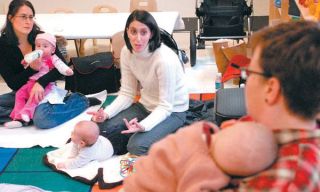“Those of you who are breastfeeding, — are you just hungry all the time?”
“How do you get them to take longer naps?”
“Have you been losing your hair? Mine has actually gotten thicker.”
It can be hard for new moms to talk about these issues for a full hour and a half with their friends. But 20 minutes after the Listening Mothers meeting at the JCC officially ended last Thursday, the conversation was still kicking.
At the group’s eighth and final meeting, babies were suckling, burping, sleeping and fussing; moms were exchanging e-mails while the group’s leader, Islander Yaffa Maritz, was encouraging them all to eat more cake.
“It’s structured, but it’s flexible enough to talk about whatever we want. Yaffa just helps take it to a deeper level,” said Abby Hirsch, a mother from Redmond.
For 10 years, the Listening Mothers program has been bringing women together to help them cope with the challenges of being new moms. It is part support group, part parenting forum. Maritz’s group aims to help mothers to not only better relate to their babies, but to themselves in their new role.
“It’s tough,” said Deborah Schneider, a Kirkland mother who went through the program earlier this year and still meets with her group informally.
“There’s a lot of healing involved,- both emotional and physical.” Over the course of eight weeks, the Listening Mothers curriculum –developed by Maritz, the program’s founder — addresses women’s identities as mothers, examines how their own childhood experiences shaped them as parents, explores the emotional bond they have with their children and the ways that parenthood alters their relationships with their partners.
What both participants and facilitators say sets Listening Mothers apart from other parenting programs is that rather than giving instruction on how to be a good parent, it turns parents’ questions back on themselves so that, in examining their individual situations, they can come up with the answers that are right for them.
If a mother wants to know, for instance, whether it’s better to have the child sleep in bed with the parents, in a crib or in a separate room, Maritz just poses the question back to them.
“I ask them what they think about it,” said Maritz, who has worked with families as a psychotherapist for many years. “Some babies love the closeness and some babies need a little bit of space. What about you and your husband? What do you prefer? I try to get them to be curious about themselves.”
The approach is inspired by the work of doctors Arietta Slade and John Grienenberger, two clinical psychologists whose research in child development has led to their founding of “reflective parenting” programs in Los Angeles and New York. The two researchers gave a presentation to JCC staff, parents and psychology professionals at the JCC last Monday night.
Slade and Grienenberger discussed their work in attachment theory and reflective functioning, clinical concepts that reflect the idea that a strong link exists between children’s healthy attachment to their mothers and their successful development; reading a child’s signals and reacting to them based on honest reflection of what he is trying to communicate help create the basis for that healthy bond. Grienenberger said that while behavioral research is nothing new, it is only within the last decade that a focus has been put on the mother’s internal experience.
“It’s about learning how to trust your instincts and interact on a meaningful level,” said Tina Weiss, a Mercer Island mother who attended the presentation and went through the program after her son was born three and a half years ago. “If you start having that early bond and communicate with your child, it makes a big difference.”
After a decade of building on this approach, Maritz now has about a dozen small groups meeting weekly with volunteer facilitators, professionals in social work or related fields who go through one year of training in infant development and attachment work for Listening Mothers. In addition to the JCC, meetings are held at Swedish Hospital, the University of Washington, Ballard Pediatrics, COR-Northwest Family Development and Family Services in Bellevue. Sessions are offered in English, Spanish and Hebrew.
Laura Jabbour, another mother at the JCC presentation on Monday night, said that her one complaint about the program is that it isn’t long enough. Her group also continues to meet informally nearly two years after their program ended.
Maritz is responding to pleas for more with plans for a complementary series modeled on the Reflective Parenting Program that Greinenberger runs in Los Angeles, which takes parents of school-aged children through a 10-week series of workshops.
“They just get so much out of it,” Maritz said. “It’s a perfect match.”


